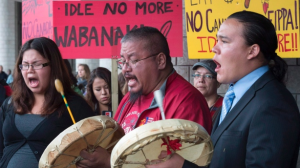Daniel Schwartz, CBC News, November 10, 2013– Idle No More, the indigenous movement that began a year ago today, says it has a database of 254,000 supporters. Some, however, are concerned about the direction its founders want to go.
A Saskatoon teach-in on Nov. 10, 2012 marked the founding — by Jessica Gordon, Sheelah McLean, Sylvia McAdam and Nina Wilson — of Idle No More, which initially focused on opposing a federal omnibus bill, now law, and its perceived threats to land, water and aboriginal rights.
Nevertheless, Idle No More hit a chord and, by also making skillful use of social media, quickly became one of the most significant protest movements Canada has seen in a long time.
“Our biggest strength is that we always left it open,” Pam Palmater, who was a spokeswoman for Idle No More in its early days, told CBC News in a recent interview. “Idle No More was to individuals whatever they wanted it to be.”
Palmater is the chair of indigenous governance at Ryerson University in Toronto, and was a candidate for national chief of the Assembly of First Nations in 2012.
“The movement became so successful, because there was no leader.”
Now, she and others are critical of some prominent members for trying to control the notably leaderless organization and its name.
“[We] don’t want to get caught up in copyrighting the Idle No More movement or setting up an office or an organization, really going down the road that is what has really killed every other kind of movement,” she said.
“For me, it’s never about the name or who started it or who owns it or any of those things,” Palmater explained. “For me it’s about the spirit of the Idle No More movement.”
Palmater said another group, the Indigenous Nationhood Movement, is headed in the direction she’d like to see Idle No More go.
That group “is talking about action on the ground, real resistance, going out and living on the land and protecting territories and exercising jurisdiction and reclaiming and reoccupying, so it’s not just about protest anymore, it’s changing,” Palmater said. She considers herself part of both movements.
Gerald Taiaiake Alfred of the Indigenous Nationhood Movement wrote earlier this year that “the limits to Idle No More are clear, and many people are beginning to realize that the kind of movement we have been conducting under the banner of Idle No More is not sufficient in itself to decolonize this country or even to make meaningful change in the lives of people.”
Read More: CBC News


 Follow
Follow